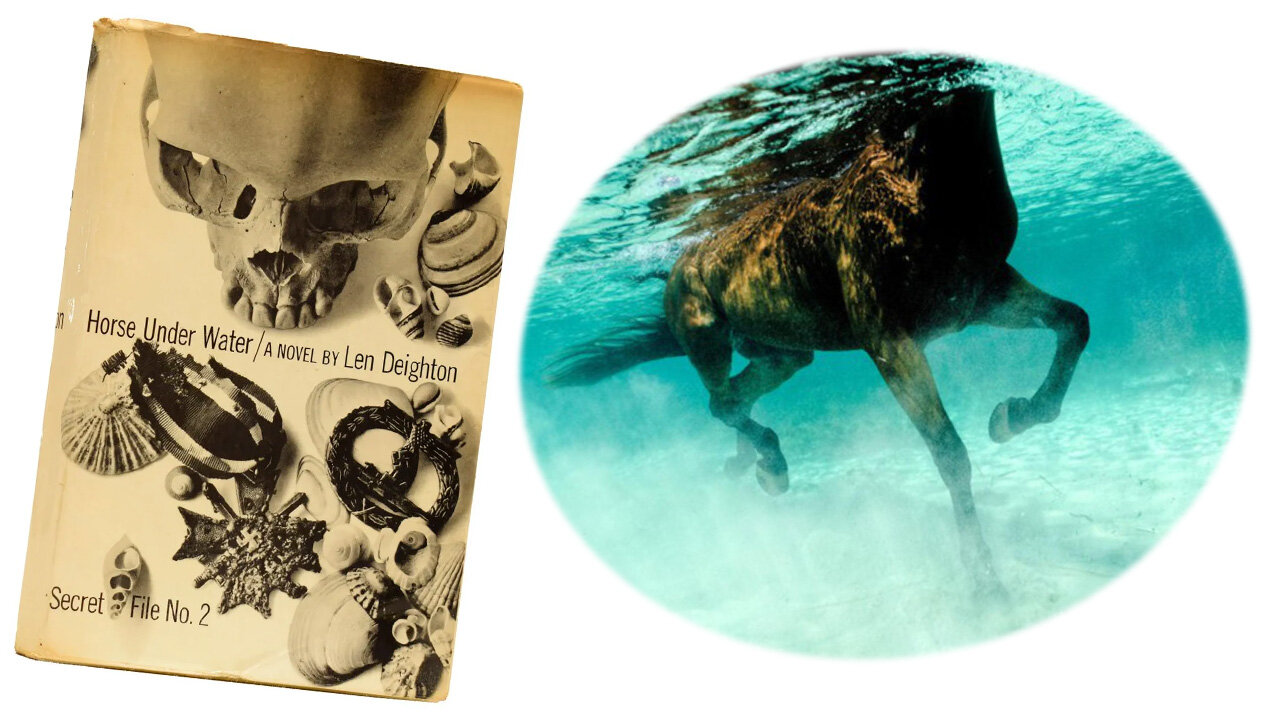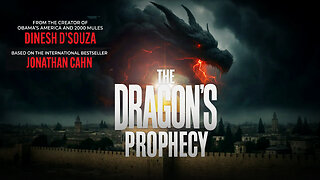Premium Only Content

'Horse Under Water' (1963) by Len Deighton
Len Deighton’s, 'Horse Under Water' (1963) is the second novel in his groundbreaking spy series featuring the sardonic, unnamed British intelligence officer who first appeared in The Ipcress File. Though often overshadowed by its predecessor and less well-known than Deighton’s Cold War classics like 'Funeral in Berlin', 'Horse Under Water' is arguably the most structurally daring and thematically rich of the early quartet. It combines classic espionage intrigue with wartime secrets, drug smuggling, and a submerged Nazi U-boat wreck off the coast of Portugal. The result is a novel that deepens Deighton’s vision of espionage as a morally compromised, bureaucratically strangled, and mentally exhausting enterprise.
Where 'The Ipcress File' offered a gritty portrait of Cold War London, 'Horse Under Water' shifts the setting to a coastal Portuguese fishing village, with much of the action revolving around a secret British diving mission. The central mystery is submerged—literally. An old German U-boat lies at the bottom of the sea, potentially containing a cache of wartime secrets: forged currency, heroin, advanced weaponry, or even Nazi gold. The ambiguity surrounding its contents reflects the fog of deception that permeates the novel.
At the core of the story is Deighton’s trademark narrator, still unnamed, still insubordinate, and still cooking gourmet meals while dodging bullets and bureaucrats alike. His dry wit, observational intelligence, and quiet contempt for upper-class privilege mark him as a distinct voice in spy fiction—an everyman caught in a world of shifting loyalties and institutional mistrust. In 'Horse Under Water', his cynicism is amplified by the strange setting and the shifting narrative alliances, as allies become enemies and mission goals become increasingly opaque.
The novel’s plot is complex and multilayered, unfolding like a deep-sea dive into moral murk. Initially tasked with a relatively straightforward underwater salvage operation, the narrator soon uncovers layers of deception involving British, American, and former Nazi interests. The U-boat itself becomes a metaphor: a relic of past conflicts sunk beneath the surface but still exerting power in the present. Deighton deftly explores the way old ideologies, wartime secrets, and moral debts linger beneath the surface of postwar Europe, occasionally surfacing in unexpected and dangerous ways.
Unlike many espionage thrillers, 'Horse Under Water' is not driven by action set pieces or shootouts. Its tension arises from ambiguity—what is the mission really about? Who can be trusted? Why is heroin mixed in with wartime technology? Deighton forces the reader, like his protagonist, to piece together a puzzle where many of the pieces have been deliberately obscured or falsified. The structure of the novel echoes this confusion: it is fragmented into brief, often cryptic chapters, some of which include footnotes—mock intelligence briefings and bureaucratic asides that reinforce the labyrinthine nature of spy work.
Stylistically, the novel is clipped, clever, and observant. Deighton’s prose is economic but textured with detail, whether describing diving gear, coded conversations, or the peculiar politics of Cold War intelligence. The diving sequences are particularly vivid, offering a rare sense of claustrophobia and physical vulnerability that contrasts with the usual swagger of the spy genre. The cold, pressurized depths of the ocean mirror the psychological pressure bearing down on the narrator.
One of the most compelling aspects of 'Horse Under Water' is its unflinching portrayal of institutional rot. The British intelligence services are not depicted as noble defenders of democracy, but as chaotic and often corrupt bureaucracies driven by internal politics, class snobbery, and secrecy for its own sake. The narrator’s superiors are evasive or duplicitous, and much of the danger he faces arises not from foreign enemies but from misdirection, manipulation, and backstabbing within his own service. This internal corrosion gives the novel a paranoid tone, one that aligns it with the emerging trend of existential spy fiction pioneered by Deighton and contemporaries like John le Carré.
Though less flashy than Fleming and more cryptic than le Carré, Deighton carves out his own space in the genre—one that emphasizes intelligence over action, ambiguity over ideology, and character over plot. 'Horse Under Water' is a fine example of this approach, offering readers a cold, submerged world where truth is as elusive as treasure, and even victories come steeped in compromise.
In conclusion, 'Horse Under Water' is a cerebral, sardonic, and subversive entry in the spy fiction canon. It invites readers to think, question, and dive deep—both literally and metaphorically—into the murky world of postwar espionage. Though it demands patience and close reading, the rewards are considerable: a masterclass in atmosphere, a meditation on trust and deception, and a chilling reminder that, in espionage, the real enemy is often unseen, and sometimes wears your own uniform.
-
 15:36
15:36
Nikko Ortiz
11 hours agoBring Back Public Shaming...
3.29K5 -
 2:43:41
2:43:41
Side Scrollers Podcast
17 hours agoAsmongold Says The Online Left Are “ANIMALS” + Hasan Collar-Gate Gets WORSE + More | Side Scrollers
8.28K9 -
 1:33:41
1:33:41
Dinesh D'Souza
2 days agoThe Dragon's Prophecy Film
79.1K58 -
 LIVE
LIVE
Lofi Girl
2 years agoSynthwave Radio 🌌 - beats to chill/game to
231 watching -
 44:08
44:08
The Why Files
6 days agoThe CIA, Men in Black and the Plot to Take Out JFK | The Maury Island Incident
43.3K63 -
 2:07:23
2:07:23
TimcastIRL
8 hours agoTrump SLAMS China With NEW 100% Tariff, Stocks & Crypto TUMBLE | Timcast IRL
285K147 -
 5:15:25
5:15:25
SpartakusLIVE
9 hours agoBF6 LAUNCH DAY || WZ and BF6 followed by PUBG - The PERFECT Combo?
58.1K3 -
 1:33:59
1:33:59
Glenn Greenwald
10 hours agoQ&A with Glenn: Is the Gaza Peace Deal Real? Why was the Nobel Peace Prize Given to Venezuela's Opposition Leader? And More... | SYSTEM UPDATE #529
114K67 -
 1:24:01
1:24:01
Flyover Conservatives
1 day agoURGENT FINANCIAL UPDATE! October 14–31: The Great and Terrible Day Has Arrived - Bo Polny; 5 Mindsets You Must Master - Clay Clark | FOC Show
52.3K5 -
 4:01:36
4:01:36
VapinGamers
7 hours ago $4.49 earnedBattlefield 6 - All Protatoe and Nothing but Net - !rumbot !music
37.1K1